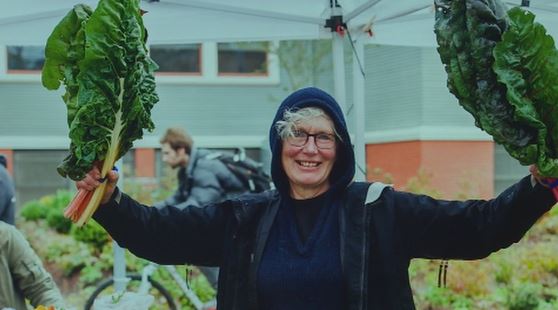As Audra Mulkern stood taking pictures around the dung heap at an Arlington farm, she couldn’t help but reflect on the long, often messy road from the cutting edge campus of Microsoft to the mundane fields of a family farm.
“It’s a very different life,” she chuckled.
Mulkern was in Redmond for the birth of the Microsoft gaming days. Now, she’s documenting the emergence of something far less high tech and far more hands on. It’s called the Female Farmer Project, a cornucopia of photos breaking down stereotypes of who is growing our food and how it’s done.
“Women have been the invisible farmer for a long time. It’s important to me to make sure they’re represented in modern media,” said Mulkern.
Mulkern never fancied herself a photographer, and still doesn’t. She started this whole thing by taking pictures of produce at farmers markets with her old iPhone 3 just for fun. She was struck by the sheer number of women farmers. From there, her photographic following grew organically – if you consider Instagram and Facebook organic. In just three years her work has been on the cover of magazines in Austria, on exhibit at Farm Aid and the subject of Ted Talks. She has photographed female farmers from Iceland, to the rooftops of New York City.
“The challenge with this photography is you have all sorts of lighting challenges, skittish animals, and of course, slippery poop,” she said.
Through her travels, Mulkern discovered a world of women who have taken to the land for their livelihoods – very few of them farmer’s daughters.
“I think I had to confront my own stereotypes, as well. At one point I started to think I might meet more people with a PhD on farms than in academia,” said Mulkern. “There’s a number of women with doctorates who are farming in Western Washington. That was a little startling to me.”
Linda Neunzig doesn’t have PhD, but she is certainly an authority when it comes to raising sheep at 90 Farms in Arlington. She’s been doing it for a quarter of a century and resents the notion of “farm woman” meaning “farmer’s wife,” as she was told at a “Women in Agriculture” conference several years ago.
“Making sure you’re available so when your husband needs parts, you can go and get parts. I don’t need to know that. I am the farmer. Tell me how to take that tractor apart and put it back together. Don’t tell me to go get the parts,” exhorted Neunzig.
Women now run 20% of the more than 37,000 farms in the state of Washington, up dramatically over the past 15 years. Their farms tend to be smaller, less mechanical and more sustainable. Part of that may be due to a desire for a healthier lifestyle for families. Neunzig said some it can be attributed to instinctive maternal qualities.
“Being able to know when an animal is ready to give birth, when something needs help, when it doesn’t, what’s normal, what’s not. It’s all very nurturing.”
Mulkern plans to continue cultivating this new notion of what it means to be a farmer through her growing sisterhood that is mowing down the “grass ceiling.”
“They’re all important women,” she said. “Their stories need to be told.”


